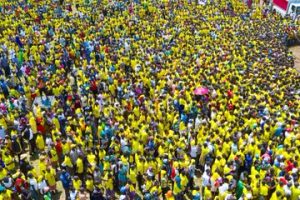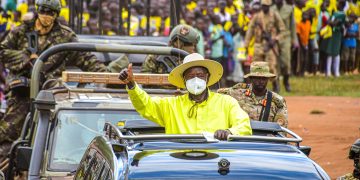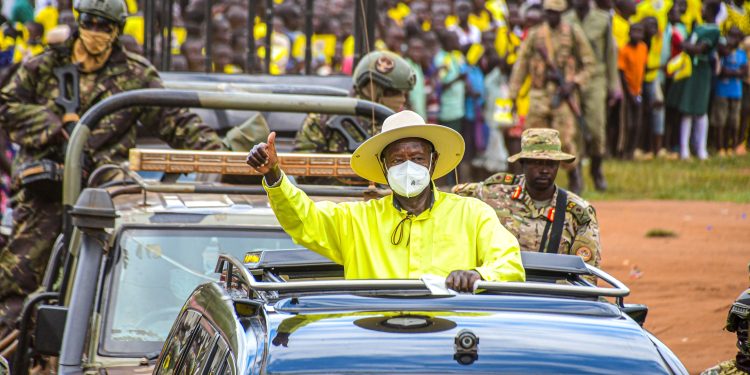Abim — President Yoweri Kaguta Museveni, the National Resistance Movement (NRM) presidential flag bearer for the 2026 general elections, has officially launched his campaign in the Karamoja sub-region, beginning with a rally at Abim Primary School grounds in Abim District.
The event marked the start of his regional campaign trail under the NRM theme: “Protecting the Gains, As We Make a Qualitative Leap into High Middle-Income Status.”
Addressing thousands of supporters, President Museveni placed peace, security, and disciplined development at the heart of his message, highlighting the NRM’s four-decade record of stability and progress.
“The NRM felt very sad for the suffering of the Karamojong,” said Museveni. “In Nakapiripirit, there was a woman who had been married to nine husbands, and all of them died in war. That’s why we said the gun must get out of the population — and we removed 41,000 guns from the people of Karamoja.”
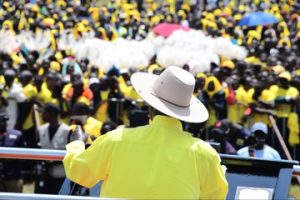
The President compared the magnitude of the disarmament campaign to historical national armies, noting that Obote’s army had 8,000 soldiers and Idi Amin’s 20,000, yet Karamoja alone had 41,000 illegal guns.
“That was suicide,” he said. “But now, because of peace, the population of Karamoja has grown from 190,000 in 1979 to over 2.5 million today.”
Peace and Unity as the Foundation
Museveni credited the region’s stability to the NRM’s deliberate rejection of sectarian politics.
“We were able to maintain peace because of good politics — rejecting tribal and religious divisions. That’s how we built strong national institutions like the Army, Police, Judiciary, and Prisons,” he said. “If somebody asks you why you vote for the NRM, tell them it’s because of peace.”
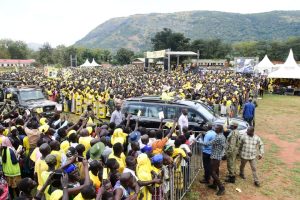
Infrastructure and Economic Progress
The President highlighted progress in electricity and road infrastructure, recalling his efforts to extend power to Abim. “When the NRM came to power, electricity stopped in Lira, and there was none in West Nile and Karamoja. The Swedes wanted to help, but when they withdrew, we decided to do it ourselves,” he said.
He listed key completed and ongoing road projects, including Nadunget–Iriiri (65.6 km), Namalu–Nakapiripirit (17 km), and Akisim–Moroto–Lokitanyala (92.3 km), among others, totalling over 180 kilometres of paved roads.
However, he criticised poor road maintenance and directed Gen. Katumba Wamala, the Minister of Works, to fix drainage problems. “When it rains, the roads become like a swimming pool. We must correct that,” he said.
Prioritisation and National Discipline
Drawing on his military background, President Museveni urged Ugandans to embrace disciplined resource use. “Recently, teachers wanted higher salaries, but roads help everyone. We in the UPDF know how to prioritise. Even in Gulu barracks, there are grass-thatched houses, but we said, Let’s first buy weapons. That’s why we can defend ourselves without the UN,” he said.
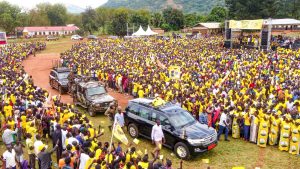
He advised that national resources should be focused on defence, roads, electricity, schools, health facilities, and railways. “The policy of touching too many things at once is a mistake,” he cautioned.
Fixing Water, Health, and Education Gaps
President Museveni acknowledged the service delivery gaps in Abim District, where only 151 of 534 villages (28%) have access to safe water. Major interventions include the Kawomeri Earth Dam (1.3 billion litres capacity), 11 valley tanks, and solar-powered irrigation systems in Puno and Akado Kulo, benefiting over 10,000 residents.
In the health sector, Abim currently has one government hospital and three HCIIIs, leaving 12 sub-counties without health facilities. The President pledged new HCIIIs in Lotuke, Morulem, Atunga, and Abuk, as well as upgrades in Awach, Arembwola, and Wilela.

In education, the district has 35 government primary schools and five government secondary schools, with four new schools under construction. Museveni reiterated his call for free education, decrying the continued charging of fees.
He also praised the Napak Skilling Hub, which has trained 1,044 youth in trades such as tailoring, welding, and carpentry, saying each district, including Abim, will receive Shs 50 million for a SACCO to support graduates.
“These children dropped out of school because of fees, but now they can make clothes, soap, metallic doors, and shoes that we used to import,” he said.
PDM and Household Wealth Creation
The President differentiated between public infrastructure and private prosperity, emphasising the Parish Development Model (PDM) as the key to household wealth creation.
“Even in Kampala, there are people in the ghettos who don’t have what to eat, yet they have had good roads for a long time. That’s why I urge you to use PDM to get out of poverty,” he said.
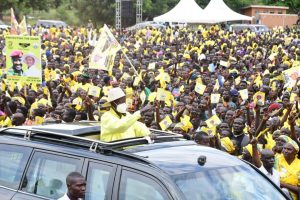
So far, Abim District has received Shs 22.2 billion under PDM, with Shs 22.1 billion already disbursed to 22,778 households (57%).
Museveni added that Uganda’s oil production, set to start next year, will further expand national revenue and accelerate infrastructure development. “Our oil will start flowing next year, and many development challenges will be fixed,” he assured.
Local Leaders Reaffirm Support
NRM leaders in Karamoja described the President’s visit as a homecoming. Hon. Lokii John Baptist, NRM Vice Chairperson for Karamoja, thanked Museveni for the peace brought through disarmament.
“You removed illegal guns in Karamoja, which had caused untold suffering. The leaders here are ready to protect that peace,” Lokii said, pledging to raise the NRM’s support in the region from 77% in 2021 to over 97% in 2026.
Abim NRM Chairperson Engorok Obin appealed for the rehabilitation of Abim Hospital, extension of electricity to unconnected sub-counties, and livestock compensation similar to other regions.
